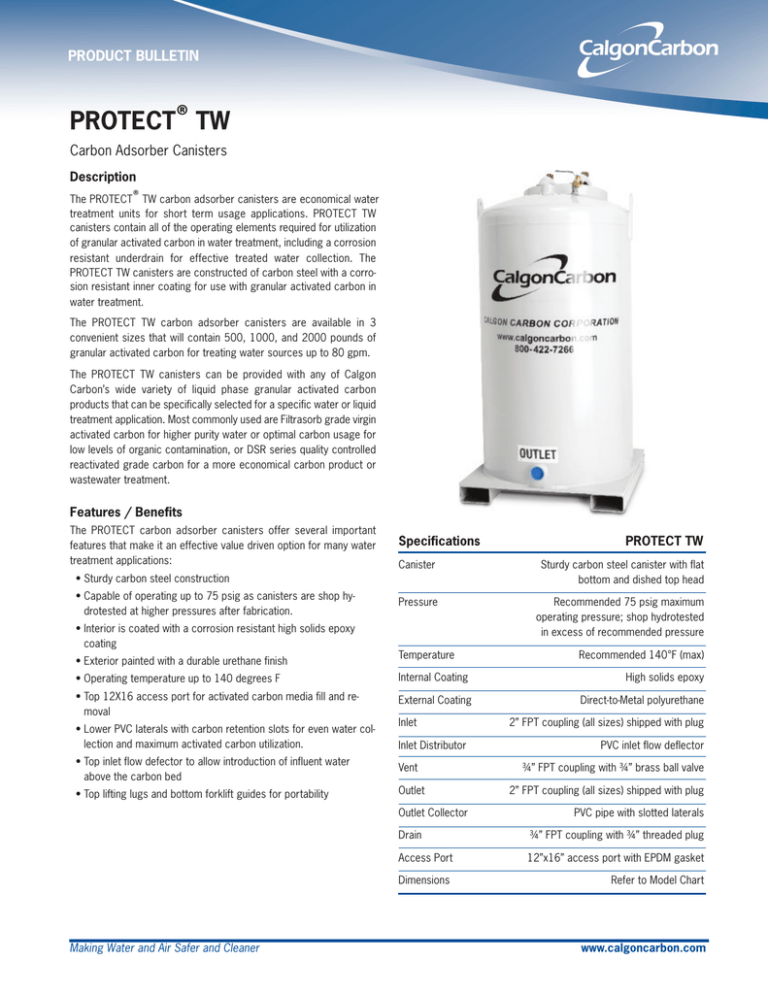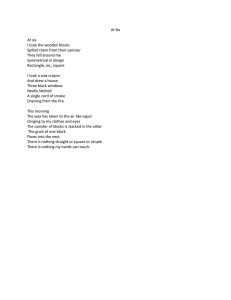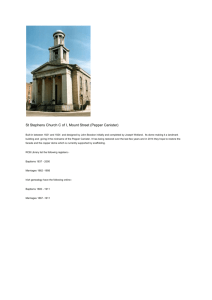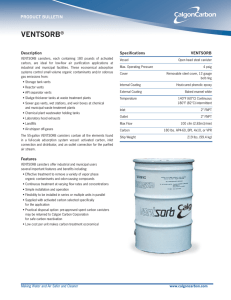
PRODUCT BULLETIN
PROTECT® TW
Carbon Adsorber Canisters
Description
The PROTECT® TW carbon adsorber canisters are economical water
treatment units for short term usage applications. PROTECT TW
canisters contain all of the operating elements required for utilization
of granular activated carbon in water treatment, including a corrosion
resistant underdrain for effective treated water collection. The
PROTECT TW canisters are constructed of carbon steel with a corrosion resistant inner coating for use with granular activated carbon in
water treatment.
The PROTECT TW carbon adsorber canisters are available in 3
convenient sizes that will contain 500, 1000, and 2000 pounds of
granular activated carbon for treating water sources up to 80 gpm.
The PROTECT TW canisters can be provided with any of Calgon
Carbon’s wide variety of liquid phase granular activated carbon
products that can be specifically selected for a specific water or liquid
treatment application. Most commonly used are Filtrasorb grade virgin
activated carbon for higher purity water or optimal carbon usage for
low levels of organic contamination, or DSR series quality controlled
reactivated grade carbon for a more economical carbon product or
wastewater treatment.
Features / Benefits
The PROTECT carbon adsorber canisters offer several important
features that make it an effective value driven option for many water
treatment applications:
Specifications
Canister
Sturdy carbon steel canister with flat
bottom and dished top head
Pressure
Recommended 75 psig maximum
operating pressure; shop hydrotested
in excess of recommended pressure
• Sturdy carbon steel construction
• Capable of operating up to 75 psig as canisters are shop hydrotested at higher pressures after fabrication.
• Interior is coated with a corrosion resistant high solids epoxy
coating
• Exterior painted with a durable urethane finish
Temperature
• Operating temperature up to 140 degrees F
Internal Coating
• Top 12X16 access port for activated carbon media fill and removal
External Coating
• Lower PVC laterals with carbon retention slots for even water collection and maximum activated carbon utilization.
Inlet
Inlet Distributor
• Top inlet flow defector to allow introduction of influent water
above the carbon bed
Vent
• Top lifting lugs and bottom forklift guides for portability
Outlet
Outlet Collector
Making Water and Air Safer and Cleaner
PROTECT TW
Recommended 140°F (max)
High solids epoxy
Direct-to-Metal polyurethane
2” FPT coupling (all sizes) shipped with plug
PVC inlet flow deflector
¾” FPT coupling with ¾” brass ball valve
2” FPT coupling (all sizes) shipped with plug
PVC pipe with slotted laterals
Drain
¾” FPT coupling with ¾” threaded plug
Access Port
12”x16” access port with EPDM gasket
Dimensions
Refer to Model Chart
www.calgoncarbon.com
Installation
Typical Installation
PROTECT TW canisters are shipped with dry activated carbon installed
in the vessel; the carbon must be wetted and de-aerated prior to use.
This procedure displaces air from the internal structure of the carbon
granule, assuring that the liquid to be treated is in contact with the
carbon surface.
Vent
P
Sample
Flexible
Connection
Discharge Loop
to Assure Flooded
Operation
P
Prior to operation, each canister must be filled with clean water;
the water should be introduced into the bottom effluent connection.
The canister should sit for approximately 48 hours to allow most
of the carbon’s internal surface to become wetted as shown on the
wetting curve.
Wetting Curve for GAC (77°F/25°C)
Filter
(Optional)
100
95
Feed Pump
% Wetted
90
PROTECT TW
Sample Drain
Operation
85
80
75
0
24
48
72
Time (Hours)
96
120
After wetting, the carbon bed can be de-aerated by draining the canister from the effluent line, and then refilling the canister upflow with
clean water. This procedure will eliminate any air pockets which may
have formed between the carbon granules. The PROTECT TW canister
is now ready for operation.
The PROTECT TW canister should be set on a flat level surface and
piped as recommended in the installation illustration. The influent pipe
should be attached to the unit by using a flexible connection to allow
minor deflection in the piping to vessel connection or the vessel top
head.
The PROTECT TW canister discharge piping should include an elevated
piping loop to ensure that the canister remains flooded with water at
all times. In addition to the piping loop, a drain connection is recommended on the discharge piping to allow for drainage of the canister
prior to disconnection or during a temporary shutdown.
PROTECT TW canisters should be full of clean water before treatment
begins. Flow rate to the unit should be determined based on required
contact time between the liquid and the carbon media. In groundwater
treatment applications, the recommended contact time, calculated on
an “empty bed basis”, is typically 8-10 minutes. Consult your Calgon
Carbon Corporation Technical Sales Representative for advice about
proper contact time for your application.
PROTECT TW canisters can be manifolded in parallel operation for
higher flow rates. For series operation, two PROTECT TW canisters
can be piped together sequentially, as normal pressure drop will not
exceed the recommended operating pressure.
The PROTECT TW canisters have adequate space for bed expansion
and can be backflushed by introducing clean water or process liquid
at approx 8-10 gpm/ft2 to the effluent connection and taking backflush
water from either the influent connection, and directing
this water to a drain suitable for receiving contaminated water with
suspended solids and carbon particles.
A filter should be installed prior to the canister if the liquid to be treated
contains substantial amounts of suspended solids. A simple cartridge
of screen filter helps prevent pressure buildup in the carbon bed.
A pressure relief device should be installed in a line open to the canister if the system can potentially be subject to pressures beyond the
design point. Consult plant and/or local OSHA codes for guidance.
Making Water and Air Safer and Cleaner
www.calgoncarbon.com
Pressure Drop
Calgon Carbon Water Treatment Systems
Pressure drop through a PROTECT TW canister is a function of
the water or process liquid flow as shown in the graph. If higher flows
or lower pressure drop is needed, multiple units can be installed in
parallel operation. The maximum pressure in the canister should not
exceed 75 psig, regardless of the pressure drop across the unit.
The PROTECT TW canisters are designed for a variety of higher
pressure water or process liquid applications at low to moderate
flowrates. Calgon Carbon Corporation offers a wide range of carbon
adsorption systems and services for a range of water or liquid flow
rates and carbon usages to meet specific applications.
Pressure Drop Curve
Estimated Pressure Drop (psi)
2.0
Vent
Inlet C
TW-72
1.5
TW-36
1.0
TW-18
0.5
0.0
20
30
40
50
Flow Rate (gpm)
60
70
80
A
E
10
B
0
Carbon Exchange or Replacement
When the treated water exceeds the desired contaminant concentration, the granular activated carbon in the PROTECT TW canister should
be replaced with fresh activated carbon. The PROTECT TW canister
is to be isolated from the process by either closing and locking the
inlet and outlet valves, or physically disconnecting the canister from
the inlet and outlet pipe or hose.
The spent granular activated carbon can be removed by using a vacuum media removal procedure through the top access port. All of the
spent carbon must be completely removed from the canister prior to
refilling the unit with fresh carbon to assure effluent water quality after
the unit is started back up again.
Cleanout
Outlet
C
D
Fresh granular activated carbon can be filled using bags or “supersacks” by loading into the canister through the top access port. In
order to prevent damage to the PVC underdrain system, a “water cushion” is to be added to the canister such that the water covers the underdrain system by approximately 1-2 feet. Once the fresh carbon is
installed, the access port securely closed, and the inlet and outlet connections are reestablished, follow the startup procedures under the
Installation section to wet the carbon.
Contact Calgon Carbon for resupply of the carbon products for effective water treatment. Calgon Carbon can also provide complete
turnkey services, including removal and management of the spent carbon and refilling the unit with the fresh carbon.
Making Water and Air Safer and Cleaner
www.calgoncarbon.com
Model Number
TW 18
TW 36
TW 72
GAC or media volume
18 cu ft
36 cu ft
72 cu ft
GAC amount
500 lbs
1,000 lbs
2,000 lbs
Recommended max flow rate (gpm)
20 gpm
40 gpm
80 gpm
Weight, empty
500 lbs
750 lbs
1,050 lbs
2,000 lbs
3,500 lbs
4,800 lbs
Diameter (A)
30 in
42 in
48 in
Can length (B)
48 in
48 in
72 in
Inlet/Outlet ( C )
2 fpt
2 fpt
2 fpt
Forkguides (D)
25 in
37 in
43 in
Overall Height (E)
60 in (approx)
67 in (approx)
91 in (approx)
Overall width
32 in (approx)
44 in (approx)
50 in (approx)
Approximate operating weight
Safety Message
Wet activated carbon preferentially removes oxygen from air. In closed
or partially closed containers and vessels, oxygen depletion may reach
hazardous levels. If workers are to enter a vessel containing carbon,
appropriate sampling and work procedures for potentially low oxygen
spaces should be followed, including all applicable federal and state
requirements. Please refer to the MSDS for all up to date product
safety information.
Making Water and Air Safer and Cleaner
www.calgoncarbon.com
50%
Corporate Headquarters
Calgon Carbon Corporation
500 Calgon Carbon Drive
Pittsburgh, PA USA 15205
800.422.7266
412.787.6700
412.787.6713 Fax
Cert no. xxx-xxx-000000
European Operations
ChemvironCarbonCorporation
ZoningIndustrielCdeFeluy
B-7181Feluy,Belgium
+32(0)64511811
+32(0)64541591Fax
www.calgoncarbon.com
Copyright© 2013 Calgon Carbon Corporation, all rights reserved.
Asia Operations
CalgonCarbonAsiaPteLtd.
9TemasekBoulevard
#26-02SuntecTowerTwo
Singapore038989
+6562213500
+6562213554Fax
Your local representative
1213



